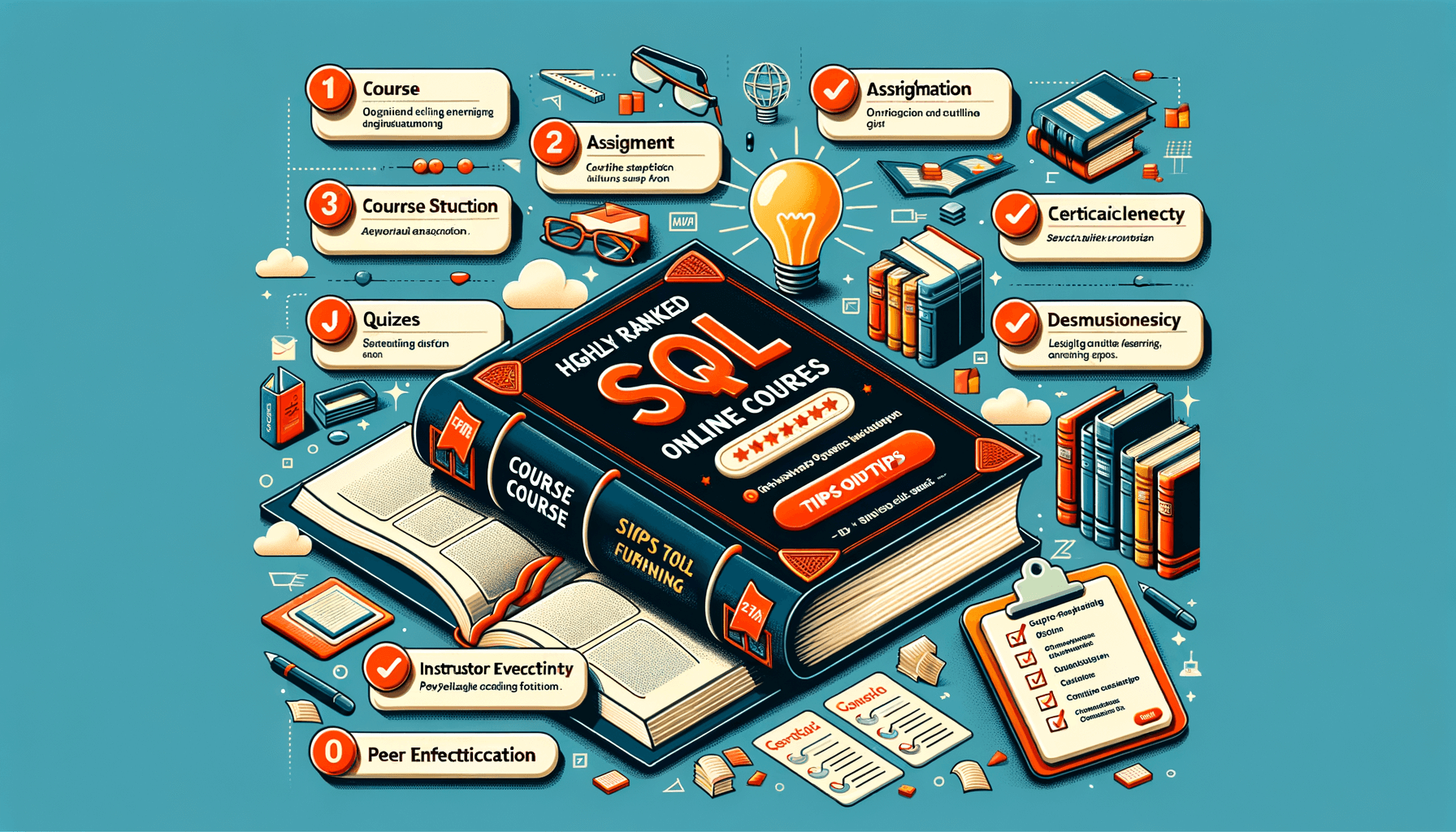A big variety of articles and resources

The Ultimate Guide to Finding the Best Free Online SQL Course
 Sia Author and Instructor
Learn SQL
Sia Author and Instructor
Learn SQL
10 minute read
Learning SQL is super important today. It's the main tool for managing and understanding data. From business reports to big data analysis, SQL is used everywhere. Finding a good free online course can be tough, but it's worth it. This guide will help you pick the best one.
Key Takeaways
- SQL is important for data management and analysis.
- Look for courses with good content and expert teachers.
- Check student reviews before choosing a course.
- Top platforms like Coursera, edX, and Khan Academy offer free courses.
- Interactive exercises and real-world examples make learning easier.
Understanding the Importance of SQL in Modern Data Management
Role of SQL in Data Analysis
SQL is a powerful tool for data analysis. It allows us to query large datasets quickly and efficiently. By using SQL, we can filter, sort, and aggregate data to uncover insights that would be difficult to find otherwise. SQL's ability to handle complex queries makes it indispensable for data analysts.
SQL in Business Intelligence
In the realm of business intelligence, SQL plays a crucial role. It helps in extracting data from various sources and transforming it into meaningful reports. Businesses rely on SQL to make data-driven decisions, track performance metrics, and identify trends. Without SQL, the process of gathering and analyzing business data would be much more cumbersome.
SQL for Database Management
SQL is the backbone of database management. It provides the commands needed to create, update, and delete database records. With SQL, we can ensure data integrity and security. Database administrators use SQL to maintain and optimize databases, ensuring they run smoothly and efficiently.
Mastering SQL is essential for anyone involved in data management, as it is the key to unlocking the full potential of data.
Criteria for Evaluating Free Online SQL Courses
Course Content and Structure
When choosing a free online SQL course, it's crucial to look at the course content and structure. A well-organized course will cover both basic and advanced topics, ensuring a comprehensive understanding of SQL. Look for courses that offer a mix of video lectures, readings, and quizzes to keep you engaged.
Instructor Expertise
The expertise of the instructor can make a significant difference in your learning experience. Courses led by instructors with extensive experience in SQL and data management are more likely to provide valuable insights. For instance, an instructor with 25 years of experience can offer practical knowledge that goes beyond textbooks.
Student Reviews and Feedback
Reading student reviews and feedback can give you a good idea of what to expect from the course. Positive reviews often highlight the strengths of the course, such as clear explanations and helpful resources. On the other hand, negative reviews can alert you to potential issues, like outdated content or lack of support.
Comparing different platforms and reading reviews can help you find the best free SQL course that meets your needs.
Top Platforms Offering Free Online SQL Courses
Coursera
Coursera is a popular platform that offers a variety of free online SQL courses. These courses are designed by top universities and industry leaders, providing a solid foundation in SQL. One of the key benefits of Coursera is the ability to learn at your own pace, making it ideal for busy individuals. Additionally, many courses include hands-on projects that allow you to apply what you've learned in real-world scenarios.
edX
edX is another excellent platform for learning SQL for free. It offers courses from renowned institutions like Harvard and MIT. The platform's courses are well-structured and cover everything from basic SQL queries to advanced database management. A standout feature of edX is its interactive exercises, which help reinforce learning through practice. Moreover, edX provides a certificate upon completion, which can be a valuable addition to your resume.
Khan Academy
Khan Academy offers a more informal approach to learning SQL. The platform provides easy-to-follow tutorials that are perfect for beginners. The lessons are broken down into short, manageable segments, making it easier to grasp complex concepts. One of the highlights of Khan Academy is its community support, where learners can ask questions and share knowledge. This makes it a great option for those who prefer a more collaborative learning environment.
For those looking to advance their careers, mastering SQL through these platforms can be a game-changer. Each platform offers unique features that cater to different learning styles and needs.
Key Features to Look for in an SQL Course
When choosing an SQL course, there are several key features to consider. Interactive exercises are crucial as they allow learners to practice and apply what they've learned in real-time. This hands-on approach helps solidify understanding and makes the learning process more engaging.
Real-world applications are another important feature. Courses that incorporate practical examples and projects enable students to see how SQL is used in actual scenarios, such as in a data analyst role. This not only enhances learning but also prepares students for real-life challenges they might face in their careers.
Certification and accreditation can add significant value to an SQL course. Earning a certificate upon completion can boost a learner's resume and provide proof of their skills to potential employers. Accredited courses often follow industry standards, ensuring that the knowledge gained is relevant and up-to-date.
Choosing a course with these features can greatly enhance your learning experience and better prepare you for a career in SQL.
Maximizing Your Learning Experience in an Online SQL Course
Setting Learning Goals
To get the most out of your online SQL course, it's crucial to set clear learning goals. Having specific objectives helps you stay focused and measure your progress. Start by identifying what you want to achieve, whether it's mastering basic queries or understanding complex database management.
Participating in Online Communities
Engaging with online communities can greatly enhance your learning experience. Join forums, participate in discussions, and ask questions. These communities often provide valuable insights and support, making it easier to grasp difficult concepts.
Utilizing Supplementary Resources
Don't rely solely on the course material. Supplement your learning with additional resources like books, articles, and videos. This will give you a broader understanding of SQL and its applications. Many platforms offer free introductory SQL courses that can serve as excellent supplementary material.
Remember, the more resources you use, the better your understanding will be. Diversifying your study materials can offer new perspectives and deepen your knowledge.
Highlights
- Having specific objectives helps you stay focused and measure your progress.
- Many platforms offer free introductory SQL courses that can serve as excellent supplementary material.
Common Challenges and How to Overcome Them
Understanding Complex Queries
When learning SQL, one of the first hurdles we face is understanding complex queries. These queries often involve multiple tables, intricate joins, and nested subqueries. Breaking down the query into smaller parts can make it easier to understand. Start by identifying the main table and then gradually add joins and conditions. This step-by-step approach helps in visualizing the data flow and simplifies the debugging process.
Debugging SQL Code
Debugging SQL code can be frustrating, especially when dealing with syntax errors or unexpected results. To tackle this, we should use tools like SQL query analyzers and debuggers. These tools highlight errors and suggest corrections, making it easier to pinpoint issues. Additionally, writing clean and well-commented code can save us a lot of time in the long run.
Balancing Theory and Practice
Balancing theory and practice is crucial for mastering SQL. While theoretical knowledge provides a strong foundation, practical experience is what truly cements our understanding. We should aim to apply what we've learned by working on real-world projects or contributing to a blog page with SQL tutorials, courses, and insights. This hands-on approach not only reinforces our learning but also makes it more enjoyable.
Remember, the key to overcoming these challenges is persistence and practice. The more we engage with the material, the more confident we become in our SQL skills.
Future Trends in SQL Education
Gamification of Learning
Gamification is becoming a popular method to make learning SQL more engaging. By incorporating game-like elements such as points, badges, and leaderboards, students can stay motivated and track their progress. This approach not only makes learning fun but also helps in retaining complex concepts more effectively.
AI-Powered Personalized Learning
Artificial Intelligence (AI) is revolutionizing education by offering personalized learning experiences. AI can analyze a student's strengths and weaknesses, providing customized content and exercises to address individual needs. This tailored approach ensures that learners can progress at their own pace, making the learning process more efficient.
Integration with Other Data Science Tools
SQL is not an isolated skill; it is often used in conjunction with other data science tools. Future SQL courses are likely to include modules that teach how to integrate SQL with tools like Python, R, and various data visualization software. This holistic approach will prepare students for real-world applications, making them more versatile in the job market.
As we look ahead, it's clear that the future of SQL education will be shaped by innovative teaching methods and advanced technologies. Embracing these trends will not only enhance the learning experience but also equip students with the skills needed for a data-driven world.
The future of SQL education is bright and full of opportunities. As technology evolves, so do the ways we learn and apply SQL. Our courses are designed to keep you ahead of the curve, ensuring you have the skills needed for tomorrow's challenges. Don't miss out on the chance to advance your knowledge and career. Visit our website to explore our course offerings and start your journey today!
Conclusion
In summary, finding the best free online SQL course requires careful consideration of several factors. You should look at the course content, the instructor's expertise, and the learning platform's reputation. It's also important to read reviews from other students and see if the course fits your learning style. By taking the time to research and compare different options, you can find a course that will help you master SQL without spending any money. Remember, the right course can open up new opportunities and give you valuable skills for your future.
Frequently Asked Questions
Why is SQL important for data management?
SQL is a key tool for managing and analyzing data. It helps you pull out the information you need from big databases.
What should I look for in a free online SQL course?
Check the course content, see if the instructor knows their stuff, and read reviews from other students.
Are there any good platforms for free SQL courses?
Yes, websites like Coursera, edX, and Khan Academy offer great free SQL courses.
How can I get the most out of an online SQL course?
Set clear learning goals, join online groups, and use extra resources to help you learn.
What are some common problems when learning SQL?
People often struggle with complex queries, debugging code, and balancing theory with practice.
What are the future trends in SQL education?
Future trends include making learning fun with games, using AI for personalized lessons, and mixing SQL with other data science tools.
Related Articles

Mastering Data with an Advanced SQL Online Course
8 minute read






